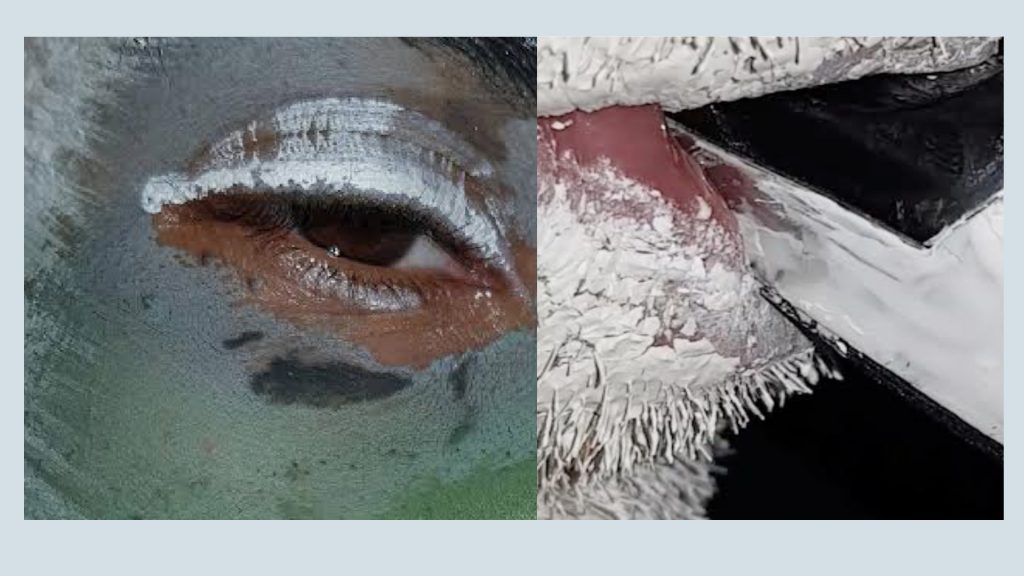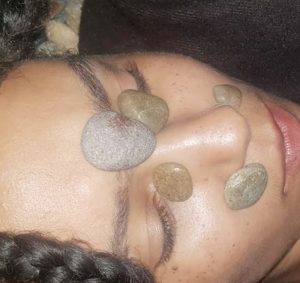CRYSTABEL RILEY: SKIN SURFACES
ZUIHITSU
QUIRKY THOUGHTS COLLECTION
Essays, personal stories and curiosities from our guest fem人le contributors
CRYSTABEL RILEY: SKIN SURFACES
As an artist I am interested in the shapes, maps and patterns, aesthetically, biologically, resonantly and historically across the various surfaces that I work with – with human skin as a Make-up Artist and drum skin as a Drummer.

Through Make-up Artistry, I have spent several years with the preoccupation around how to increase my understanding and connection with the objects I work with: the ingredients, the peoples they are from, and how these objects relate to the physical surface of the earth’s crust, mining practices, symbiosis, surface residues, and the irony of the impact left by what we do in relation to Make-up and beauty. This has informed my stylistic approach, and had a massive effect on how the physical surface – human skin – looks. This process has been public, dialogical and evolving, an exploration rather than a static space that could be inhabited – it’s also been really confusing.
As a Drummer working with skins on round resonant objects is something that is essentially private space of self-care and ritual. The work becomes public through projects or concerts – there is a deliberate limitation of the amount of concerts and of the people attending – so I can explore attempts to self-heal-care-enjoy acts of skin exploration and try to personally, and occasionally communally, understand what I am doing – it’s also been very confusing.
Both practices are linked through the ethos of public and private exploration of ‘physical surfaces’ but trying to centre on ‘meaningfulness’ within the confusion of exploring a meaning and battling against a lack of one.
Listed below are just some of the dual explorations and parallels between these two surfaces, one living (human skin), one dead or never alive since 1957 (when plastic replaced hide in drum sets.

RESONANCE
The resonance of wearing Make-up (or choosing not to) with our feelings and behaviour is colossal. We can walk, talk and breathe differently. Prosthetic lashes add consciousness to blinking. Prosthetic nose pieces made for New Noveta contained most of the nasal breathing and so stimulating another type of ‘Make-up resonance’ through the performance-body.
‘Drum-resonance’ of course is the basis of all sound, but, the drums, and my interest in them, works with moving between lack of, and abundance of, resonance – doubling and tripling recycled and discarded skins to limit and expand the resonance.

PATTERNS
We (Make-up Artists) create patterns by working on different areas of the face that can clash or harmonise.
The drumset is the same. Beats work with different combinations of sound around different elements of the drum-kit/face, for example:
the kick drum, the lips, the snare drum, the eyes, the floor tom, the cheeks.

HISTORY & FUTURE
The decisions other people have made can give us a language to tell new stories.
An eyebrow at a particular angle in combination with a pointy lip…
A snare hit in combination with a skipped kick-drum…
might represent periods of revolution or social upheaval from another time in another part of the world. New stories can be told using languages that can further extend creative oppression or creative up-lift.
I have read of, talked with, and worked on the skin surface of Zinnia Kumar a Model, Ecologist and Scientist researching Colourism. Zinnia writes on Orientalism within the context of fashion shoots, as an example of how problematic some story-telling can potentially be.
But the power can work in both ways and both Make-up and music use some type of historical language (or negation of language) to create uplifting futures.

VOLUME & POWER
This can be said aesthetically but also in a biological way using the lymphatic system, using ancient knowledge (of which the proper accreditation has been buried) to stimulate pressure points and make movement happen around the face. This idea, that naive volume = power is challenged here; the amount of pressure is very important, too heavy and the nodules are ‘squashed’.
Playing loud can sacrifice other types of sonic movement whilst ‘big’ Make-up can undo a bigger statement.
But with sentiment and consideration maximal volume and maximal Make-up can be effective and very enjoyable. Here we see volume and power and insecurity and security connect and intersect from Drums and Make-up.

During the late naughties Crystabel Riley toured Japan and Europe using drums, electronics and make-up in noise trio Maria and the Mirrors.
This was the start of her interest in patterns on skins – human and drum.
This interest in dimensional patterns existing on (and off) different surfaces has continued to evolve through exploring the idea of ‘care and uncare’ of the skin, self, others, and the world, across all of Crystabel’s practices as an Artist (Make-up, Drum).
Crystabel has been a long term collaborator with Sue Lynch who welcomed her into the Horse Improvised Music Club, where she collaborated with Caroline Krabel, John Edwards, and Steve Beresford who welcomed her into the London Improvisers Orchestra.
She is currently working on the multi-format duo project @xcrswx with Seymour Wright.
